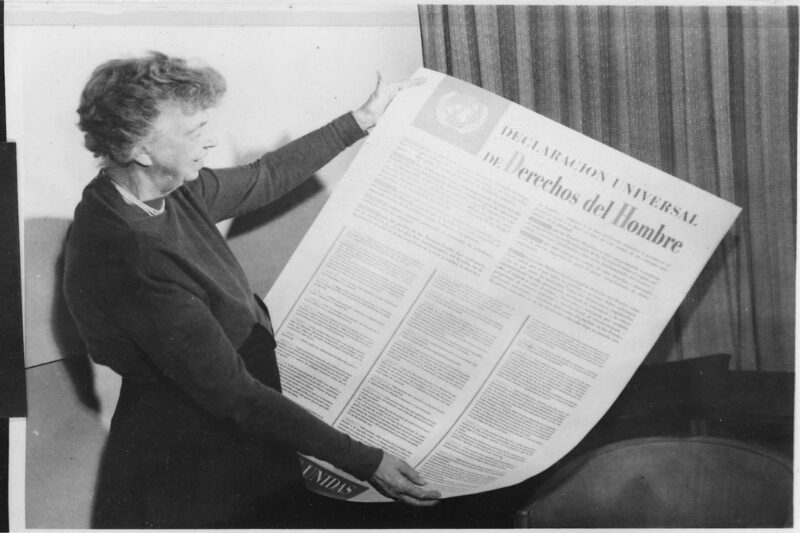
Saturday is International Human Rights Day, commemorating the day in 1948 when the United Nations General Assembly adopted the Universal Declaration of Human Rights. The significance of the day and its history is something that President-elect Donald Trump should reckon with after running a campaign that demonstrated outright contempt for human rights, particularly his “love” of waterboarding.
Right now, we don’t yet know what Donald Trump will try in office. But to fight against any policies embodying the islamophobia, xenophobia, racism, or misogyny that were embraced during his campaign, we know that we have decades of international human rights law on our side. And no president can undo that because ratified treaties are not just lofty aspirations — under the Constitution they’re “the supreme law of the land.”
In the aftermath of the horrors of World War II, the international community resolved to establish a robust international framework to maintain peace and security and promote human rights. It created the United Nations and the modern human rights system.
Since then, the United States has played a critical role in creating global and regional human rights institutions based on treaties and international conventions that protect a whole host of human rights. Among the ratified agreements are the International Covenant on Civil and Political Rights, the Convention Against Torture, and the International Convention on the Elimination of All Form of Racial Discrimination.
With American leadership, the global community established standards for the treatment of prisoners of war and prosecuted war crimes and crimes against humanity at Nuremberg. Today, the Geneva Conventions are binding on every country and are among the universally accepted laws of war, categorically prohibiting acts of torture and cruelty.
In 1951, the international community was faced with the daunting task of establishing international cooperation in resettling vulnerable refugees following the war and protecting their most basic human rights. The U.S. led the global effort to establish the Refugee Convention, which now forms the international standards for refugee protection and resettlement. Under it, countries may not discriminate against refugees on the basis of “race, religion, or country of origin.” Our country is a nation of immigrants and must continue to be seen as a safe haven to refugees from around the world. It’s the right and moral thing to do.
Despite our all-too-often shortcomings in practicing at home what we preach abroad, more often than not, the U.S. has helped make these global commitments stronger. However, we've also benefitted tremendously from our investment and engagement with international law and institutions. Though its universality may make it seem abstract, international law has a tremendous impact in nearly all facets of our daily lives, from environmental well-being and public health to high-stakes governmental questions of public safety and armed conflict.
These international agreements are still binding on us today, and they will continue to be under a President Trump. No matter how hard he tries to establish mass deportations, it’ll still constitute a flagrant violation of international law. No matter how hard he tries to bring back “waterboarding, or a hell of a lot worse,” torture will remain illegal under both the Geneva Conventions and the Convention Against Torture (in addition to U.S. law). No matter how hard he pursues a total or even partial ban on entry for Muslim refugees and immigrants or tries to re-enact Bush’s failed NSEER discriminatory registry program, international law still forbids them.
Hopefully, Trump will realize that even if he decides to flout international human rights law, he would only be undermining our country’s interests. When the U.S. commits human rights abuses, other countries follow. It sets off a domino effect causing further instability, conflicts, and violence. And we lose the moral authority to do anything about it. We would also alienate allies on a whole host of issues pertaining to our national interest, including trade and sharing intelligence to fight real threats abroad.
Trump campaigned on his ability to make a deal. But human dignity and fundamental human rights are off-limits for bargaining. Protecting them and living up to our international obligations are the best deal for the American people and the rest of the world.

